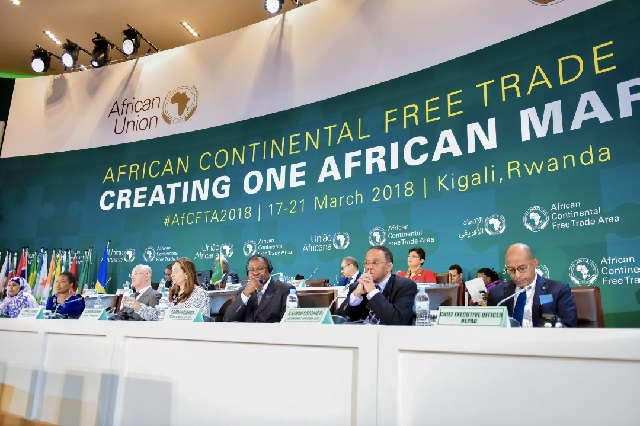- Leads formation of African Manufacturers Association
The Presidential Steering Committee on the African Continental Free Trade Area (AfCFTA) Impact and Readiness Assessment, plans to present its recommendations to President Muhammadu Buhari in January 2019, according to the Senior Special Assistant to the President on Media and Publicity, Garba Shehu, in a statement on Thursday, in Abuja.
AfCFTA is designed to be a pan-African free trade area that will create a single market for goods and services, and liberalise and facilitate the movement of investment and business people across the continent.
He noted that Nigeria has yet to sign the AfCFTA Agreement, which seeks to remove all forms of restrictions to trade and investment flows within the African continent.
This comes as Nigeria, through the President of the Manufacturers Association of Nigeria (MAN), Mansur Ahmed, has been appointed the Interim Chairman of the Committee to evolve the African Manufacturers Association (AMA).
This follows the announcement by the Commissioner of Trade, African Union Commission (AUC), Albert Muchanga, at the just-concluded Intra-African Trade Fair (IATF) which held in Cairo, Egypt.
The Director-General, MAN, Segun Ajayi-Kadir, in a statement said the role of the Chairman is to supervise the process of working out the modalities of the Association, in conjunction with other members, including drafting Articles of Association for the body in preparation for its inauguration next year.
Also, Ajayi-Kadir and the Head of Kenya Association of Manufacturers Consulting, Joyce Njogu, were appointed as joint interim secretaries to drive the process.
Recall that MAN had kicked against the signing of the AfCFTA agreement pending the conduct of an independent study to affirm its concerns.
As at yesterday, the number of countries that signed the agreement had increased to 49, while 14 countries have already ratified it, according to Muchanga.
The agreement will become binding and implementation can begin once 22 states have ratified it.
Shehu in the statement said government had launched a nationwide stakeholder consultation with the purpose of reflecting a wide range of views in the technical instruments.
“It would be recalled that on October 22, 2018, while inaugurating the Committee at the Presidential Villa, President Buhari had charged it to assess the extent to which Nigeria is ready to join the agreement, and what the impact of doing so would be.
“The Committee, which was given 12 weeks to conclude its assignment has held wide consultations with industry groups and stakeholders, including the Manufacturers Association of Nigeria (MAN).
“While opinion is still divided in Nigeria on the merits and demerits as well as the timing of joining the AfCFTA, the committee has commissioned a study to shed more light on the public debate on the issue in the aftermath of a recent report published by MAN.”
Shehu quoted MAN in its report that if Nigeria ratifies the agreement, import surges would range from 27.6 per cent for textile, apparel and footwear sub-sector to 180.7 per cent for chemical and pharmaceutical products during the three phases of liberalising tariff lines with five per cent tariff rates.
“According to MAN, in contrast, the import surge will be as high as over 2,000 per cent in motor vehicle assembly sub-sector over 15 years when 10 per cent tariff rates are liberalised. This will instantly spell doom for the automotive aspect of Nigeria’s National Industrial Revolution Plan (NIRP).”
The MAN study, he said, also shows differing output, employment and investment effects across manufacturing sub-sectors.
“For instance, four sub-sectors (Food, beverages and tobacco; wood and wood products; textile, apparel and footwear; and non-metallic) will likely see substantially high rates of increase in imports and import competition coupled with a substantial decrease in output,” he added.
According to him, some sectors such as electrical and electronics and wood and wood products will lay off workers, saying: “The MAN study goes further to show that huge investments are required in chemical and pharmaceutical products and textile, apparel and footwear sectors, while moderate investments are required in electrical and electronics.”
“The key message from the MAN study is that despite challenges, Nigeria should go ahead and sign the AfCFTA agreement with an informed mindset, committing itself to engaging in negotiations of the AfCFTA, embed itself in the process and ensure that the AfCFTA delivers good results for its manufacturers, especially as it relates to taking benefits of the market access opportunities on the rest of the continent.”
Shehu revealed that the study also offered recommendations on how expected losses can be defrayed for the manufacturers and how policies can be used to deal with expected losses, and focused mainly on “defensive” dimension of trade in goods (i.e. import penetration).
He, however, said the report has not given adequate attention to “market access” opportunities (i.e. export penetration) and does not include the analysis of trade in services.
“Therefore, another study has been commissioned recently to address the gaps in the MAN study and is expected to be completed by the end of December 2018.
“Once completed, the study is expected to shed more light on the public debate and add value to the work of the Presidential Steering Committee on the AfCFTA Impact and Readiness Assessment,” he said.
With regard to the AMA, Ahmed, while accepting the role, said he and other members of the Steering Committee will commence work on engaging all the manufacturers associations across Africa to mid-wife the birth of the Pan-African body.
He said: “now is the time for the private sector to come together to tackle the challenges that hinder intra African trade.”
He further said the platform of the Association will enable manufacturers in Africa to engage, know and work with each other better, which will bring about inclusive growth in Africa.
Inaugurating the Interim Council, Muchanga noted that establishing the Association is a direct fallout of the African Union’s initiative to promote and deepen intra-African trade in goods and services with the cooperation of individual African countries particularly the private sector.
The official inauguration of AMA is expected to hold before or during the African Industrialisation Day in November 2019.










